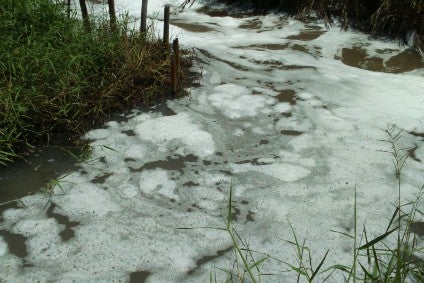
A campaign group’s investigation into the production of viscose at factories owned by Aditya Birla in India and Indonesia has found conditions have got “markedly worse” over the past year.
Changing Markets Foundation today (28 February) published the latest edition of its Dirty Fashion report – an update on its 2017 investigation, in which it called out a number of fashion giants, including Sweden’s H&M and Inditex’s Zara for buying viscose from the two “highly polluting” factories.

Discover B2B Marketing That Performs
Combine business intelligence and editorial excellence to reach engaged professionals across 36 leading media platforms.
Fashion brands linked to polluting viscose producers
The ‘Dirty Fashion revisited: spotlight on a polluting viscose giant‘ report also name UK retailers Asda, Next and Burton as continuing to source viscose from the factories that it says are releasing toxic pollution into the environment. Both are owned by Aditya Birla Group – the world’s biggest producer of viscose.
A spokesperson for Changing Markets Foundation told just-style: “Aditya Birla Group is the world’s biggest producer of viscose, with a 20% market share and a supplier to major fashion brands. The company sells itself on its sustainability credentials. Yet, it has repeatedly denied findings from Changing Markets’ report and has failed to put forward a plan to remediate the situation on the ground.”
The investigation found that conditions at the company’s Grasim Industries viscose plant in Madhya Pradesh, India, were “markedly worse” than a few months before. Specifically, more sites were characterised by visible and strong-smelling pollution, which had turned the water dark red, while an independent laboratory test found the level of carbon disulphide in the air outside the factory was 125 times WTO guideline value.
At the group’s Indo-Bharat Rayon (IBR) plant in Indonesia, the investigation found the river water around the factory’s discharge pipe to be “extremely polluted” and not even complying with ‘worst-in-class’ Indonesian water quality standards. Locals have also reportedly witnessed evidence of regular illegal discharges into the river by IBR, usually at night-time or after rainfall.

US Tariffs are shifting - will you react or anticipate?
Don’t let policy changes catch you off guard. Stay proactive with real-time data and expert analysis.
By GlobalDataChanging Markets Foundation says Aditya Birla has repeatedly refuted the report findings and claims the wastewater and air emissions at its Grasim plant meet all applicable norms, and that its does not contribute to the pollution of the Chambal River, where its plant in Madhya Pradesh is located.
“Our investigation suggests that Aditya Birla Group is failing to live up to its sustainability claims,” says Natasha Hurley, campaign manager at Changing Markets. “Brands buying from the company should look beyond the green spin to understand what is really happening on the ground, where local residents’ and workers’ lives are blighted by pollution on a daily basis.”
The report coincides with the launch of the Foundation’s ‘Roadmap towards responsible viscose & modal fibre manufacturing‘ aimed at promoting the integration of more sustainable practices into the supply chain.
Since the 2017 report, brands including Inditex/Zara, H&M, Asos, Tesco and Marks & Spencer have committed to incorporating Changing Market’s Roadmap into their sourcing policy, and to working towards responsible viscose and modal fibre manufacturing.
Viscose is the third-most-used fibre in the textile industry after polyester and cotton, and its use in clothing is increasing worldwide. It has the potential to be a largely sustainable fibre, as it is made from plant matter and is biodegradable. However, manufacturing viscose requires hazardous chemicals.
Changing Markets, along with a group of other NGOs, is now calling on other brands and retailers to adopt the Roadmap. They are urging Aditya Birla to transparently report on its emissions levels to air and water, supported by third-party verification, hire an external auditor to investigate workers’ health and safety at its sites, and establish an independent and transparent grievance mechanism for workers and local communities.
The group is also calling for brands and retailers to clearly state their expectations of clean viscose to manufacturers, and for the Indian and Indonesian governments to set limits on industry-specific parameters in viscose fibre production and regularly inspect and monitor companies’ compliance.
“This report again shows that the garment industry needs to take big steps towards a sustainable future,” says Paul Roeland from the Clean Clothes Campaign. “Only with full transparency along the supply chain, coupled with proper inspections, can this be moved forward. Due diligence on environmental and social protection is not an optional luxury but a fundamental duty of brands, suppliers, and investors, wherever production takes place.”





